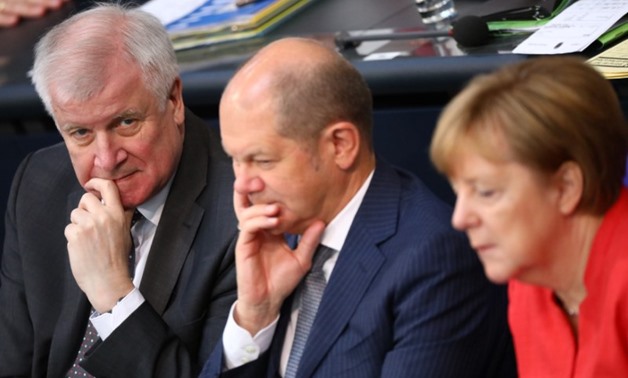
Reuters. Budget debate at the lower house of parliament Bundestag in Berlin
BERLIN - 6 July 2018: The parties in Germany's ruling coalition on Thursday reached agreement on a package of measures to deal with asylum-seekers who have already registered in other European Union states, and vowed to push ahead with an immigration law before year's end.
The two-page agreement, reached after a short meeting at the historic Reichstag building, ends a bruising dispute that had threatened to tear apart Chancellor Angela Merkel's 'grand coalition' just months after it took power, and left the four-term leader politically weakened.
Interior Minister Horst Seehofer, leader of the Bavarian Christian Social Union (CSU), had triggered the crisis when he threatened to defy Merkel's wishes and turn back at the German border migrants who had registered in other EU states.
The parties agreed to speed up the process of returning asylum-seekers who had already registered in other EU countries, under existing EU rules, and to turn back such migrants at the border - but only if agreements were in place with the country where they first registered.
Despite backing off his call for border zone transit centres, Seehofer told reporters he was "extremely satisfied" with the deal.
The agreement calls for asylum-seekers registered in other countries to be processed within 48 hours in police facilities - not separate transit centres - if they could not be transported to the Munich airport to be returned to the country where they first registered.
Andrea Nahles, leader of the centre-left Social Democrats (SPD), and German Finance Minister Olaf Scholz, also an SPD member, stressed the agreement would not involve creation of any transit centres or unilateral action by Germany.
Nahles told broadcaster ZDF the deal would not require any legal changes, and said it was up to Seehofer's ministry - which oversees the border police - to accelerate the asylum process.
"I want to be very clear that we did not agree to some kind of a compromise. Instead we drafted a new proposal that includes reasonable solutions, and the CDU/CSU has performed a piece of theater in the last three weeks that was unworthy of this country, our country," Nahles said.
Annegret Kramp-Karrenbauer, general secretary of Merkel's Christian Democrats (CDU), welcomed the agreement and said it laid the groundwork for a more unified approach on migration.
"With this, the entire coalition has committed to the goal to order, control and limit migration," she said. "This agreement makes it possible that our migration policy is effective, that it remains humane and that it will succeed."
As the agreement was reached, a new poll conducted for broadcaster ARD showed growing public frustration over the migration debate.
Nearly three-quarters of those surveyed said Seehofer had weakened German conservatives through his brinkmanship, and 78 percent said they were unhappy with the coalition's work.
Fifty-six percent of Germans felt too much focus was being put on migration, to the detriment of other issues.
In a sign of growing strains within Seehofer's CSU, his deputy, Manfred Weber, called for the party to focus more on mainstream voters. In an essay to be published Friday in Die Welt newspaper, Weber accused the established political parties of adopting what he called "topics of the political fringes".
Annual migrant arrivals peaked in 2015 at over one million people, many of them fleeing Syria's war and therefore entitled to asylum, while others were trying to escape poverty. Arrivals have since dropped sharply to the tens of thousands.
In 2017, a total of 15,414 people applied for asylum at German borders, with 1,740 of those applications made at the German-Austrian border - or around 4.7 per day, according to data from Seehofer's ministry provided to Left party lawmakers.
Some in the SPD have accused Seehofer of sparking the coalition crisis for purely self-serving reasons - his CSU fears hemorrhaging voters to the anti-immigrant Alternative for Germany in Bavaria's state election in October.
Seehofer and Austrian Chancellor Sebastian Kurz met in Vienna on Thursday and said they would discuss with Italy how to shut the migration route into Europe across the Mediterranean.

Comments
Leave a Comment